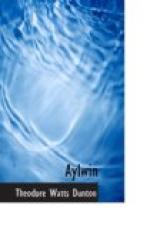How could I help taking it alone when none would sympathise with me? My brother Frank called me ‘The Black Savage,’ and I half began to suspect myself of secret impulses of a savage kind. Once I heard my mother murmur, as she stroked Frank’s rosy cheeks and golden curls, ‘My poor Henry is a strange, proud boy!’ Then, looking from my crutches to Frank’s beautiful limbs, she said, ’How providential that it was not the elder! Providence is kind.’ She meant kind to the House of Aylwin. I often wonder whether she guessed that I heard her. I often wonder whether she knew how I had loved her.
This is how matters stood with me on that summer afternoon, when I sat on the edge of the cliff in a kind of dull, miserable dream. Suddenly, at the moment when the huge mass of clouds had covered the entire surface of the water between Flinty Point and Needle Point with their rich purple shadow, it seemed to me that the waves began to sparkle and laugh in a joyful radiance which they were making for themselves. And at that same moment an unwonted sound struck my ear from the churchyard behind me—a strange sound indeed in that deserted place—that of a childish voice singing.
Was, then, the mighty ocean writing symbols for an unhappy child to read? My father, from whose book, The Veiled Queen, the extract with which this chapter opens is taken, would, unhesitatingly, have answered ‘Yes.’
’Destiny, no doubt, in the Greek drama concerns itself only with the great,’ says he, in that wonderful book of his. ’But who are the great? With the unseen powers, mysterious and imperious, who govern while they seem not to govern all that is seen, who are the great? In a world where man’s loftiest ambitions are to higher intelligences childish dreams, where his highest knowledge is ignorance, where his strongest strength is to heaven a derision—who are the great? Are they not the few men and women and children on the earth who greatly love?’
II
So sweet a sound as that childish voice I had never heard before. I held my breath and listened.
Into my very being that child-voice passed, and it was a new music and a new joy. I can give the reader no notion of it, because there is not in nature anything with which I can compare it. The blackcap has a climacteric note, just before his song collapses and dies, so full of pathos and tenderness that often, when I had been sitting on a gate in Wilderness Road, it had affected me more deeply than any human words. But here was a note sweet and soft as that, and yet charged with a richness no blackcap’s song had ever borne, because no blackcap has ever felt the joys and sorrows of a young human soul.
The voice was singing in a language which seemed strange to me then, but has been familiar enough since:
Bore o’r cymwl aur,
Eryri oedd dy gaer.
Bren o wyllt a gwar,
Gwawr ysbrydau.[Footnote]




